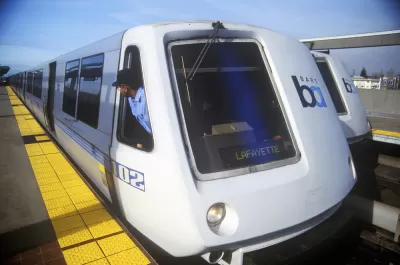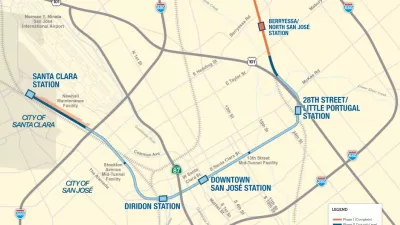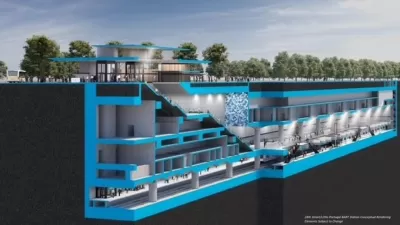The Santa Clara Valley Transportation Authority unanimously approved the 30-year, half-cent transportation sales tax for the countywide ballot in November. $1.5 billion in tax revenues would go to Phase II of a BART extension in the Silicon Valley.

According to Cindy Chavez, VTA board chair and Santa Clara County Supervisor, an "extensive and inclusive public outreach effort" influenced the 18-member Board of Directors of the Santa Clara Valley Transportation Authority (VTA) in approving a third sales tax measure to fund a proposed, 16-mile BART extension in the Silicon Valley.
The first BART sales tax measure, a half-cent, 30-year sales tax known as Measure A [PDF], passed with 73 percent of voters in 2000, according to VTA. In 2008, Santa Clara County voters approved Measure B, a 30-year eighth-cent sales tax to "generate dedicated revenue to fulfill VTA's obligation to BART for the operation, maintenance, and future capital reserve" of the 16-mile Silicon Valley BART extension. It barely passed, receiving 66.78 percent of the votes. Dedicated sales tax measures must pass with a two-thirds threshold in California.
The six-mile BART Silicon Valley Phase II Extension Project, which includes a 5.1-mile-long subway tunnel through downtown San Jose and four additional stations, continues where the Berryessa extension (Phase I) ends and will receive the largest chunk of the new sales tax measure, at $1.5 billion. Last March it got a critical go-ahead from the Federal Transit Administration.
Other transit projects and programs will be funded as well, according to the VTA press release, including:
- Caltrain Capacity Improvements at $300 million
- *Caltrain Grade Separations at $700 million
- Transit Operations at $500 million
*Depending on how one characterizes train grade separations, which arguably benefit motorists more than train passengers on the Caltrain line (which has preemption with crossing gates), about half the funds will go to road projects:
- County Expressways at $750 million
- Highway Interchanges at $750 million
- Local Streets and Roads at $1.2 billion
- State Route 85 Corridor at $350 million
And not to be forgotten:
- Bicycle/Pedestrian Program at $250 million
VTA, not BART, assume responsibility for "designing and constructing the BART Silicon Valley Project," notes their FAQ.
VTA will own all of the property, facilities and equipment related to the project. When the project is completed, BART will operate and maintain the system under an agreement executed with VTA.
Silicon Valley Phase I, the 10-mile, two station extension to Berryessa, is projected to open in 2018.
Santa Clara County, with 1.918 million (July 2015) people, is the most populous county in northern California, and the sixth in the state.
"If approved by voters, the tax could take effect in April 2017 and bring the county's sales tax rate to 9.25 percent, just short of the 9.5 percent maximum allowed by the state," writes Eric Kurhi for The Mercury News.
Hat tip to MTC-ABAG Library.
FULL STORY: Santa Clara County to Vote on BART Silicon Valley Phase II Extension Tax

Alabama: Trump Terminates Settlements for Black Communities Harmed By Raw Sewage
Trump deemed the landmark civil rights agreement “illegal DEI and environmental justice policy.”

Study: Maui’s Plan to Convert Vacation Rentals to Long-Term Housing Could Cause Nearly $1 Billion Economic Loss
The plan would reduce visitor accommodation by 25% resulting in 1,900 jobs lost.

Planetizen Federal Action Tracker
A weekly monitor of how Trump’s orders and actions are impacting planners and planning in America.

Grand Rapids Mayor Proposes Garage Conversion Plan
The mayor says allowing homeowners to convert garages to dwelling units could alleviate the city’s housing shortage.

Baltimore Ordered to Improve Sidewalk Accessibility
The city is one of many to face lawsuits for failing to comply with the Americans with Disabilities Act.

This Toronto Suburb Has More Bus Riders Than Columbus, Ohio
Brampton, Ontario used gradual improvements in service to prove that if you build it, they will ride.
Urban Design for Planners 1: Software Tools
This six-course series explores essential urban design concepts using open source software and equips planners with the tools they need to participate fully in the urban design process.
Planning for Universal Design
Learn the tools for implementing Universal Design in planning regulations.
Smith Gee Studio
Alamo Area Metropolitan Planning Organization
City of Santa Clarita
Institute for Housing and Urban Development Studies (IHS)
City of Grandview
Harvard GSD Executive Education
Toledo-Lucas County Plan Commissions
Salt Lake City
NYU Wagner Graduate School of Public Service




























